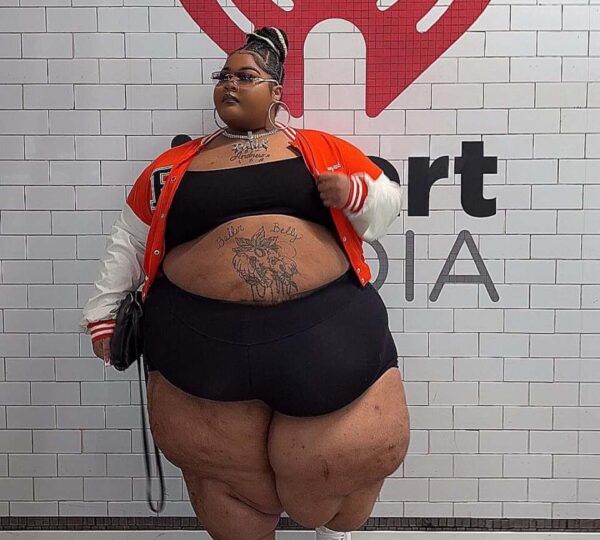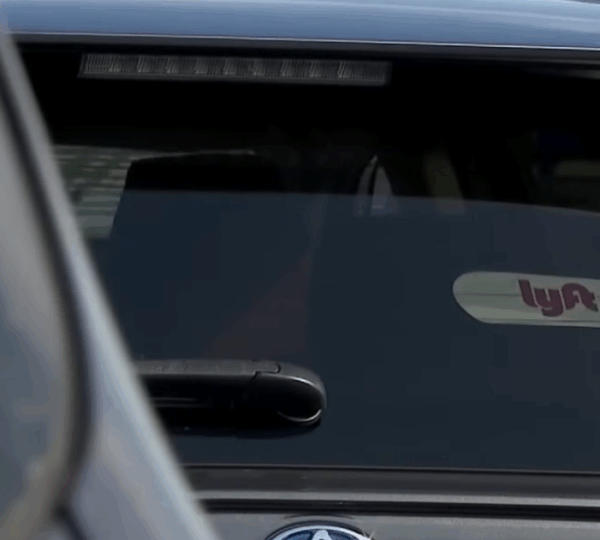A Michigan-based rapper is taking legal action against Lyft after claiming one of the company’s drivers refused to pick her up because of her body size — an encounter that was captured on video and has since gone viral, sparking nationwide debate about discrimination, respect, and the treatment of plus-sized passengers in the gig economy.
36-year-old Dajua Blanding, who performs under the stage name Dank Demoss, says she never expected what should have been an ordinary ride to turn into a deeply humiliating experience — one that would ultimately push her to file a lawsuit against one of the largest rideshare companies in the United States.
Earlier this month, Blanding ordered a Lyft ride from her Michigan home, expecting a quick and uneventful trip.
But what happened next, she says, left her shocked and hurt. When her driver arrived — in a black Mercedes-Benz — he reportedly locked his doors upon seeing her and hesitated to let her in.
According to Blanding, the driver rolled down his window and began questioning whether she would fit comfortably inside his car. “I can fit in this car,” she’s heard saying in the now-viral video she recorded on her phone.
The driver’s response, captured clearly in the footage, was blunt and dismissive: “You can’t, believe me.” Moments later, he canceled the ride altogether and told her she wouldn’t be charged — before driving off.
Blanding says the brief but tense encounter left her shaken. “It was embarrassing,” she told Fox 2 Detroit.

“I’ve been in cars way smaller than that. I just want people to understand how painful it is to be treated like that — like you don’t deserve to exist in certain spaces because of your size.”
The Video Goes Viral — and Public Opinion Splits
Within hours of posting the clip to her Instagram account, the video spread rapidly across social media platforms, drawing tens of thousands of views and hundreds of comments.
However, public reaction was divided.
While many expressed sympathy and outrage on Blanding’s behalf, a surprising number of commenters sided with the driver — calling his actions “reasonable” and suggesting that he may have been concerned about the comfort or safety of his vehicle.
Some users even referenced vehicle weight limits or seat design concerns, arguing that the driver’s refusal wasn’t necessarily discriminatory.
Others advised that she could have ordered a Lyft XL, a larger vehicle option meant to accommodate multiple passengers or more spacious seating.
Still, Blanding rejects those justifications. “This isn’t about car space,” she said. “It’s about how he looked at me and made an instant decision that I wasn’t worthy of his time. That’s discrimination — plain and simple.”

A Legal Battle Over Body Size Discrimination
Blanding’s attorneys, Zach Runyan and Jonathan Marko, filed a lawsuit on her behalf, alleging that the incident violates Michigan’s Elliott-Larsen Civil Rights Act — one of the few anti-discrimination laws in the U.S. that explicitly protects individuals from bias based on weight.
“I knew immediately that what happened was both illegal and wrong,” Marko said in an interview.
“Michigan law is clear: You cannot refuse someone service because of their size, just like you can’t refuse service based on race, gender, or religion. This kind of prejudice has no place in our society.”
The lawsuit claims that the driver not only refused to let Blanding into his vehicle but also insinuated that her weight could damage his car’s tires or seats.
For Blanding, these comments weren’t just offensive — they were dehumanizing. “He didn’t see me as a person,” she said. “He saw me as a problem.”
Her attorneys say they hope the case will set a precedent that forces companies like Lyft and Uber to implement stronger protections for passengers who experience weight-based discrimination.
Lyft’s Response and Company Policy
In a statement provided to several media outlets, Lyft reaffirmed its commitment to ensuring safety and respect for all users on its platform.
“Everyone should be treated with respect and kindness,” the company said. “Harassment and discrimination of any kind are strictly prohibited by our community guidelines and terms of service.”
Lyft has not publicly commented on the specifics of the lawsuit, citing ongoing legal proceedings. However, the company emphasized that it regularly reminds drivers and passengers alike to adhere to its anti-discrimination policies.
Despite those assurances, critics argue that rideshare companies often fail to enforce such policies consistently, leaving passengers — especially those from marginalized groups — vulnerable to bias and mistreatment.
“It’s About Dignity”: Blanding Speaks Out
In the days following the incident, Blanding continued to speak openly about her experience. She posted another video on Instagram, standing confidently in yoga shorts and a jacket, declaring that she would not be silenced or shamed.
“I’m not going to hide or apologize for who I am,” she said in the clip. “People like me deserve to be treated with respect — not laughed at or rejected because of how we look.”
Blanding has also been candid about her personal health journey. In a heartfelt post last December, she revealed that she once weighed over 500 pounds and has since lost nearly 40 pounds through gradual lifestyle changes.
She says the lawsuit isn’t about revenge or money — it’s about raising awareness and demanding accountability.
“This is bigger than me,” she explained. “There are people who deal with this kind of discrimination every single day — at work, in stores, in hospitals. If I stay quiet, nothing changes.”
A Broader Cultural Conversation
The case has reignited public discussions about body shaming, weight discrimination, and how society perceives plus-sized individuals, especially women.
Social media has amplified both sides of the debate — from those calling for empathy and inclusivity, to those defending businesses’ right to set practical limits.
Experts say the incident reflects a wider tension in the gig economy, where independent contractors often make split-second decisions that can carry serious legal implications.
“Drivers have discretion,” said one civil rights analyst. “But when discretion turns into discrimination, that’s where companies like Lyft have to step in.”
For Blanding, the issue is ultimately about more than one uncomfortable moment. It’s about what that moment represents. “This wasn’t just about a ride,” she said.
“It was about how society sees people like me — and how easily we’re dismissed.”
Moving Forward
As the lawsuit moves through the legal system, it could become a landmark case for weight discrimination in the context of rideshare services.
Advocates for body positivity say they hope it will push companies to adopt clearer guidelines, improved driver training, and better mechanisms for reporting bias.
For now, Blanding says she’s focused on healing, performing, and continuing to use her platform to advocate for self-love and equality.
“I want people to know that your size doesn’t define your worth,” she said. “And if standing up for myself helps even one other person feel seen — then it’s worth it.”


